Due to global warming, tick habitat range has drastically increased and tick season is much longer. So, it’s no surprise that tick-borne diseases like Lyme are on the rise. Parts of the USA, Canada, UK, and Europe have seen an almost tenfold increase in tick diseases over the past decade – and the numbers keep rising. (1, 2, 3, 4, 5)
The following methods can help you prevent tick bites naturally. However, it’s important to understand that they won’t keep ticks completely off of you. Natural tick prevention methods simply aren’t as effective as chemical tick repellents.
While I understand that you don’t want to slather yourself in chemicals, you’ve got to weigh the risks. In many areas, the risk of tick-borne disease is worse than the risk of using chemical repellents. I recommend using permethrin since it is applied to your clothing and not your skin, so there is little risk of the chemical getting into your body. Permethrin is also more effective than sprays like DEET or picardin. Read about permethrin here.
Natural Tick Bite Prevention
The following natural methods of preventing tick bites can be used by themselves or in addition to a repellent like permethrin. Don’t forget to do tick checks frequently and carry a tick removal tool with you while hiking: The sooner you get a tick off your body, the less likely it is to transmit disease.
1. Stay Out of Vegetation

All of these women were covered in ticks after this walk!
During the early spring, nymph ticks are found on low-lying vegetation and piles of leaf or other brush. These nymph ticks can attach to your feet or ankles and climb up your body. As the season progresses, the adult ticks are able to move upwards into higher grasses and vegetation.
One of the most effective ways to naturally prevent ticks is to simply stay on the trail while hiking or when outdoors. Ideally, you walk in the center of the trail where you are less likely to touch vegetation growing off-trail.
This applies to your dog too. Even if you are in a park which allows dogs to go off-leash, you shouldn’t let your dog off the trail. Not only is your dog more likely to get ticks, but off-trail dogs can damage plants, get attacked by animals, or infect wildlife with their waste. Read more about etiquette when hiking with a dog here.
Tips:
- Try to use the bathroom before you hike. If you have to go off-trail to go to the bathroom, try to do it in an area without tall grasses or thick brush.
- Pay attention to where you sit down during breaks. Instead of sitting on logs surrounded by grasses or leaf litter, consider sitting on a pad in the middle of the trail instead.
2. Wear the Right Clothes the Right Way
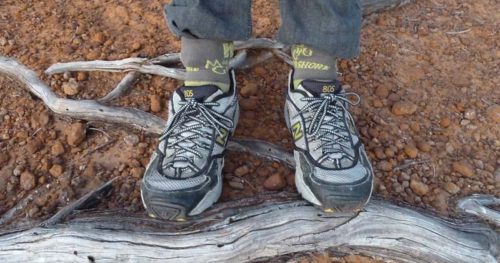
Ticks can detect your breath, body odor, body heat, and vibrations from your movements. It doesn’t matter what you wear: they will find you. However, your clothing can prevent ticks from biting you or at least delay it.
Here’s what to wear to prevent tick bites:
- Choose light-colored clothes: This will make it a lot easier to see ticks which get on you so you can remove them quickly.
- Wear long sleeves and pants: Adult ticks can’t get through your clothes, especially if the fabric has a tighter weave, so they will have to crawl around your clothes looking for skin to bite. This can take a while, which means they might never get a chance to bite before you change your clothes. Nymph ticks are small enough to get through your clothes, but long sleeves and pants can at least delay it for a little bit.
- Tuck your pants into your socks: This makes it harder for ticks which get onto your shoes to crawl up your legs. Note that nymph ticks can easily get through your socks, so you’ll have to tuck your pants deep enough so they go into your boots. Unfortunately, few people actually do this because it looks so nerdy. Remember being tick-wise is cool.
- Tuck in Your Shirt too: This is especially important in summer when adult ticks are found in higher vegetation and can get on your torso.
- Don’t wear sandals while hiking: You should never wear sandals while hiking anyway, but open-toed shoes are especially inviting to ticks.
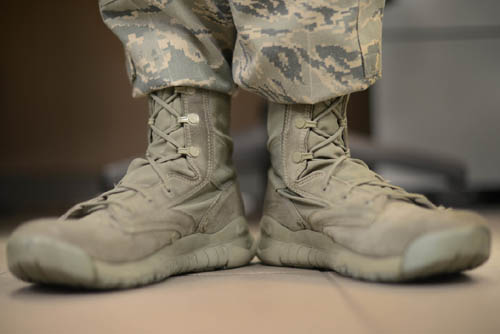
One of the reasons the military “blouses” their pants into their boots is to keep pests like ticks out.
3. Put Your Clothes in the Dryer
After going to tick-infested areas, there might be ticks on your clothing which didn’t have a chance to bite yet. Depending on the humidity, ticks can live for days to month on your clothes! These unattached ticks could linger in your home and bite you later on.
You might think that washing your clothes after getting home would kill ticks but, scarily, some ticks can survive your washing machine. One researcher found that 25% of deer ticks survived his washing machine, even at the hot cycle with laundry detergent used. (Source)
However, ticks are very sensitive to low humidity. An hour on the hot cycle of your dryer will kill any ticks on your clothing.
When you get home:
- Wash and dry your clothes immediately
- Or put the clothes in the dryer on the hot setting
- If you can’t dry the clothes right away, keep them in a sealed plastic bag until they can go through the wash/dryer cycle.
4. Shower After Hiking
Because ticks can survive so long under water, showering won’t kill any ticks on your body. Likewise, showering won’t get rid of ticks attached to your body. However, showering can flush away unattached ticks before they have time to attach to you. You’ll still need to do a tick check after showering though.
Tip: If you shave (leg, armpits, groin, etc.), do it before you go in tick-infested areas. It’s easier to spot ticks on hairless skin.
5. Do Tick Checks Frequently
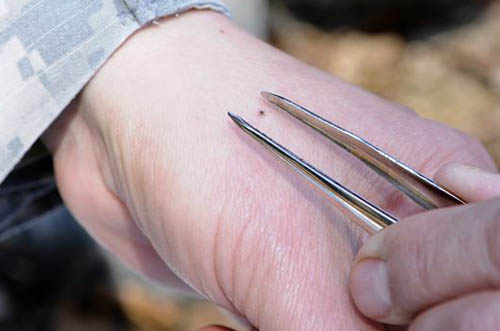
The sooner you check for ticks, the more likely you are to find them before they have time to attach. Even if they have already attached, ticks must be attached for at least 24-36 hours to transmit Lyme. The faster you find and remove ticks, the less likely you are to get Lyme.
From personal experience, I can tell you that ticks sometimes even take days to attach. As a kid, I went with a hike with my family and ended up with over 50 nymph ticks on my body (strangely, no one else in my family had any ticks). It’s really difficult to find those tiny nymphs. My dad did daily tick checks and we still found some unattached ticks which we’d missed several days later!
This just shows how important it is to frequently check for ticks, and not just right after you get back from a hike or tick-infested area.
To check for ticks:
- Look for any small dark dots on your body
- Especially pay attention to creases, like your armpits, behind your knees and groin
- Have someone look through your hair
- Use a mirror to check your private areas
6. Essential Oil Tick Repellents
A lot of people swear by essential oils as a natural tick repellent. Unfortunately, few of these essential oils have actually been tested or proven effective. There are only three plant oil ingredients on the list of registered EPA repellents. These are repellents which have been proven safe on the skin and scientifically proven to be effective.
The natural tick repellents found in EPA-registered products are:
- Citronella
- Oil of lemon eucalyptus
- Catnip oil
This doesn’t mean other essential oils won’t repel ticks; only that there isn’t enough evidence about their efficacy. Even when they are effective (like the three EPA-listed oils above), they aren’t nearly as effective as a repellent like permethrin against ticks. You’ve really got to balance your desire to be all-natural with the risk posed by ticks. In areas at low-risk for Lyme, it might be okay to go with essential oils. In high-risk areas, you are probably better off with permethrin.
Read more about essential oils for ticks here.
7. Vinegar
Vinegar is another natural tick repellent that hasn’t been thoroughly tested. However, a lot of people swear by vinegar for keeping ticks off.
To use, mix a solution of 50/50 vinegar and water in a spray bottle. Spray the solution all over your dog or onto your clothing. Even if it doesn’t work, apple cider vinegar is a good remedy for dry skin and will give your dog a nice shiny coat.
Natural Tick Prevention Methods which Are NOT Effective
The following natural tick repellents often get hyped up online. However, studies have repeatedly found that they simply don’t work to repel ticks. Not only will you waste money using them, but they could give you a false sense of security against ticks. It’s better to stick to the tried-and-true methods to prevent tick bites.
Ultrasonic Collars
These collars are supposed to repel ticks by emitting ultrasound frequencies. Studies like this one show that they do not work, so don’t waste your money.
Garlic
This is another natural tick repellent which gets mentioned a lot, but there is no evidence that garlic repels ticks, regardless of whether you eat it or apply garlic oil to your skin. Garlic might be effective at keeping away gnats, flies, and mosquitoes, but you really have to apply or eat a huge amount of it. Decide for yourself whether it’s worth putting up with the stink.
Tick Wrist Bands
You can get wrist bands which have essential oils like citronella on them. Yes, some essential oils have been proven to repel ticks – but most aren’t very effective. Further, for essential oils to work, you have to apply them all over your clothes or skin. Even if wrist bands work against ticks, they’d only keep ticks off of your wrist and not other places around your body.
What method do you use to prevent ticks? Let us know in the comments.
Also read:
- Best Tick Removal Tools for Humans
- How to Remove a Tick Head Stuck in Your Skin
- Essential Oils for Repelling Ticks
- Permethrin Clothing Against Ticks
- What Are Tick Tubes?
Resources for this article:
http://gundogforum.com/forum/viewtopic.php?t=29156
https://publichealth.yale.edu/eip/Images/handbook_tcm405-54964.pdf
https://www.germanshepherds.com/threads/most-effective-essential-oil-concoction-to-prevent-ticks.726826/
https://bushcraftusa.com/forum/threads/tips-for-avoiding-dealing-with-ticks.174374/
https://publichealth.yale.edu/eip/Images/handbook_tcm405-54964.pdf
https://www.consumerreports.org/pets/should-you-use-natural-tick-prevention-for-your-dog-or-cat/
https://www.cdc.gov/ticks/life_cycle_and_hosts.html
https://nysipm.cornell.edu/whats-bugging-you/ticks/tick-faqs/#natural-products
https://ucanr.edu/blogs/blogcore/postdetail.cfm?postnum=10461
Image credits:
“A Long Walk” (CC BY-NC 2.0) by jeff_godofbiscuits
“Tick Protection + Cool Points” (CC BY 2.0) by k.steudel
(U.S. Air Force photo by Airman 1st Class Brittany Perry) https://www.usafe.af.mil/News/Article-Display/Article/254671/air-force-army-partner-to-combat-tick-borne-diseases/
https://www.aviano.af.mil/Articles/Photos/igphoto/2001261424/, U.S. Air Force photo by Airman 1st Class Deana Heitzman/Released)


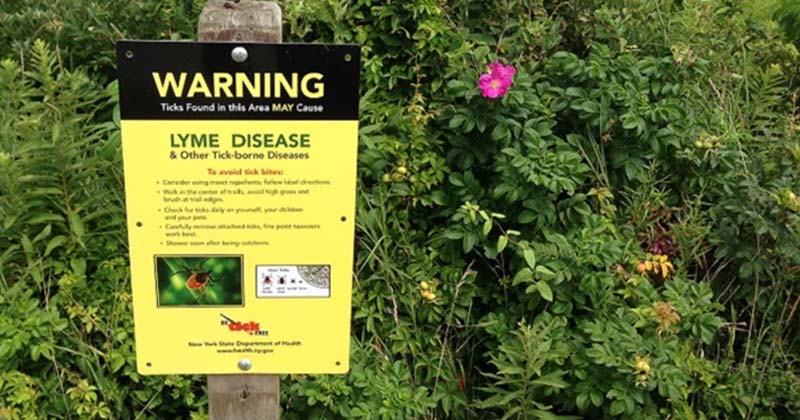

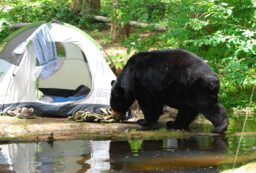








2 Comments
Shaun Underwood
July 6, 2023 at 3:36 amHello first time reader. I’m 47 years old and I never ever want bothered or worried about ticks as a child or growing up in the military although the threat was there . The older I get the more worried I become to the point now I don’t want to go camping a wild camping at all.. I’ve been researching thoroughly these past few weeks as I am about to go on a one week wild camping.. I was going to go to the Pennines all the Yorkshire moors area but settled on the lake District as this seemed to promote wild camping.. I don’t mind telling you a 47 I spider’s but I can control them but now I am petrified of ticks and I am a 47 year old month who served in the military and recently got back from Ukraine.. I think it’s because of multiple serious disease but I don’t want this to put me off while the camping.. I’ve read your website you’re prevention your tips etc but one thing I cannot find for love or money and this is probably simply because ticks are everywhere right now and I mean everywhere.. first of all in the lake District I was thinking of going and staying near waterfall areas because I suffer from tinnitus in my left ear.. but then the research that I find about ticks they love damp areas.. so as you can imagine, the image that I had in my head of my tent pitching near a wonderful stream soon went out of my head.. no I’m thinking maybe the very very rocky parts of lake District where the grass isn’t so long and there are more rocky outcrops.. so is there a particular place where ticks are less to be inside the lake district in the UK… Will it not matter where I go.. yes I could stay on a camp site that sprays for ticks.. that wouldn’t be very wild camping would it and my idea is to escape from people to spend a little bit of time out there in the wild with just my own company.. I don’t know maybe because I’m 47 I’ve hit that part of my life where my mortality starts to matter and I don’t feel so indestructible as I once did in my twenties and thirties even the beginning of my 40s… I’ve tried looking for up-to-date maps of where tick infestations are more likely to be but cannot find anything and trust me I want to research this now thoroughly as I know the hidden dangers out there we cannot just be free and stupid as we once were..and what I mean by stupid I don’t mean to be disrespectful I just mean to be carefree.. maybe I should have just said that, 😁 so yeah it’s worrying.. obviously I will be taking all the sprays and I will be spraying all my socks my boots.. unfortunately I don’t wear bright clothes when I go camping I tend to wear military style boots camouflage because that’s what I used to wearing it’s what I’m comfortable.. bright yellow and bright orange isn’t my forte.. so yes obviously I will be spraying everything but there must be some locations that really do put the percentage of ticks being around.. yes I’ve heard you say that direct sunlight stay away from wooded areas like forests places with leaves on the floor that’s not my style of wild camping.. I just meant on some of the fells right up on the hills where people don’t normally camp.. I know the other year we had to pull 11 huge ticks from my mum’s Collie dog and these were from her back garden after he’d been walking through the vegetation.. so if this can happen in my own mother’s back garden I guess it answers my question, there is nowhere safe . I know there are sheep called herdies in the lake district that are up on the mountains and the fells of the lake district and they know ticks will eat them alive or maybe they get dipped in special stuff to prevent this I’m not sure I’m not a veterinarian or a farmer.. so once again is there any areas that you can go to that really decreases where ticks will be on the fells or the mountains of the lake District. Would be going near water be a very dangerous place with ticks infestations..
Like I said I never had to bother about stuff like this didn’t care to even enter my head but when you start watching these videos about such diseases you become paranoid and very fearsome.. I’m one of these people who research things thoroughly hence why and contacting you.. I can go on YouTube because there are thousands videos but how do you trust them?
Your advice seems to be sound.. hence again why I contact you and please forgive me for my long email message etc
I hope you find the time to reply when it’s convenient of course.. thank you for the amazing work and helping people be safe and enjoy camping.. thank you, stay healthy. Best wishes shaun Underwood.
Diane
July 6, 2023 at 12:58 pmHi. I get your fear. Ticks are nasty and I freaked out the first time I had one on me. I freaked out the second time too, but a bit less. Now, I don’t care about them at all (though do take appropriate precautions and check myself before going to bed each night).
Honestly, your fear seems a bit overblown. I’d recommend that you
1) Put permethrin spray on all your clothing.
2) Stop going down a rabbit hole of “research” into tickborne diseases on YouTube.
3) Practice “Emergency Conditioning” visualization techniques to help you mentally prepare (info here:https://www.military.com/special-operations/seal-training-mental-preparation.html). For example:
-Imagine walking through some tall grass to go pee in the woods.
-Imagine finding a tick crawling on you and how you’d get it off.
-Imagine getting out your tweezers and removing a tick which bit you.
If you imagine all of this stuff in EXTREME DETAIL, then it tricks your brain into thinking you’ve already gone through it. Then it won’t be as scary when you actually have to go through it.
Btw, I do this with first aid scenarios. Like imagining how I’d splint my kid’s leg if she fell and broke it while backpacking in the wilderness. Luckily I’ve never had to do this, but I would be less likely to freak out if I did.